His name was Justus White, but they called him Jut. The Army had taught him welding and vehicle mechanics in World War II, so when he came home, he thought he would try opening his own shop.
He married and had a couple of boys. He worked long hours and managed to make enough to support his family and keep things going, but just barely. Then one day, an older customer who was fond of Jut asked him why he didn’t sell tires. Selling something like tires might add to his income without too much extra work. Jut responded that he couldn’t afford to buy any tires to sell. So the customer offered to lend him the money to buy a small stock. Jut took him up on it, and by the time the young mechanic had sold the last tire, he had made enough to pay back his lender and buy more. His life changed at that point. He saw a possibility of getting a little bit ahead.
Jut had grown up as a farm kid. The son of a tenant farmer, who had migrated to Illinois from western Kentucky around 1915. Many of his school mates descended from families who had come to Illinois much earlier, when land was cheaper and more readily attainable. Their families owned their farms and were better off financially. Jut always sensed that these boys and their families looked down on him, and he resented it mightily.
Years later, he would take pleasure in getting the better of them in business whenever he could.
As the years passed, Jut maintained his welding and repair business, but he began selling more and more merchandise. In addition to tires, he sold oil and lubricants, parts, general hardware, and, eventually, used farm equipment.
To house his growing operation, he acquired a much larger repair garage across from his current shop at the west edge of town. A substantial brick structure (it had actually begun life as a brick factory), the building stretched the length of a large lot, but was narrow enough to leave much of the lot for parking vehicles, tractors, etc. The front of the building housed the office and retail space, the center section housed tires and surplus merchandise, and the rear of the structure contained the repair shop, with lifts, tire-changing machine, welders, tool racks and work benches.
A huge St. Bernard guard dog lived in the center of the building. His thundering bark would echo along the cement floors and brick walls in all directions and make one’s hair stand on end. He sounded large enough to eat a person whole. But he was actually rather gentle and a touch lonely.
While the front of the building, with its office and its aisles of hardware shelves felt a bit crowded and gritty, its atmosphere was softened by the quiet, gentle presence of Jut’s wife, Francis, and her assistant, Shirley, who handled paperwork, over-the-counter sales and administrative tasks.
The rear of the building, on the other hand, could only be described as unsettling. It was a cavernous space with a high ceiling and an aging, cracked concrete floor stained by years of oil and grease spills. A massive ventilation blower, suspended from the ceiling, roared overhead much of the time. Air compressors clattered and hissed, air-wrenches rattled and whirred. Steel hand tools clanked onto the concrete floor, acrid-smelling red-hot sparks and metal bits from welding torch operations spewed in multiple directions. Hammers pounded and clanged.
And it was all just the way Jut liked it. The harshness of the surroundings seemed to please him.
I once saw Jut straighten up from some sort of metal fabricating operation at the edge of the room and turn toward the center of the shop holding what must have been a 20-pound hunk of steel. He paused for a moment and then thrust the hunk of steel straight out in front of him, opened his hands and let it drop. It crashed to the concrete floor with and explosive clang. Jut stood there for a moment more, unphased, a grin of satisfaction slowly taking shape on his face.
I worked at Jut’s shop, White’s Repair, for a couple of summers as a teenager. I came to the job in something of a roundabout, small-town way.
I had worked for his oldest son, Al, first. Al joined the Marine Corps in the mid-1960’s and saw horrific combat in Vietnam. He had an artistic bent and wound up opening his own autobody paint and repair shop.
Al had tried working for his dad when he got back from Vietnam, but it didn’t last long. He often did not see eye-to-eye with Jut. Once, as he turned and walked away after a disagreement with his dad, Al felt the breeze of a large wrench whiz past his head and then saw the wrench crash into the wall in front of him. He immediately walked out and went looking for employment elsewhere.
Tempers cooled over time, and father and son made amends, but Al struck out on his own professionally. By the mid-1970’s, he’d opened a paint and body shop in a former gas station near the center town. Al knew my dad, and starting in 1975, when I was 12 years old, I spent a couple of summers as his helper at the body shop. I made the princely sum of $1.00 per hour. But I was more than pleased with that. I would have had nothing otherwise. Plus, I was learning something—both about autobody work and the larger world. Al had seen exotic, far-off places and had many interesting stories. He was also something of a philosopher and had a funny and entertaining personality.
One day, Al’s dad, Jut, stopped by to say hello and check on his son’s operation. He spotted me washing the windshield of a car with some frustration. I was rubbing the windshield frantically with a cloth, trying to remove streaks from the glass. Streaks that I had created. But the harder and faster I rubbed, the more streaks I made. After watching me for a bit, Jut stepped over, grinned and said, “Hey, slow down there, young man. You don’t have to work so hard.” He told me that instead of wiping with a back-and-forth motion, to wipe the glass with a circular motion. The streaks would disappear. I tried it, and it worked.
This was my first time meeting Jut. With great relief, I thanked him for his advice. He smiled and asked, “You’re Oscar’s grandson, aren’t you?” I confirmed that I was. He smiled again, turned and said goodbye to Al, and then climbed in his pickup and pulled away.
My grandpa, Oscar, my mother’s dad, also came from a tenant-farming family. They had migrated from the same part of Kentucky to central Illinois about ten years after Jut’s family. Oscar was fifteen at the time. He and Jut had known each other for decades.
About three years later, I met Jut again, but under very different circumstances.
At age fifteen, I took on a part-time job at a dairy farm west of town. I helped with the milking after school and on weekends. One weekend day, the father and sons who owned the farm took me with them to a farm equipment sale. A place where farmers upgrading their equipment or getting out of the business auctioned off old tractors, plows, grain augers, etc.
Jut and some of his workers were there, too. A huge part of Jut’s business by now entailed buying used farm equipment at auction, refurbishing and reselling it.
As we all stood crowded together in front of the auctioneer, Jut noticed me. He stepped over and asked, “You’re working for Darryl now?” I affirmed that I was. “How do you like it?” he asked. I told him I liked it.
The sale progressed, and near the end of it, Jut stepped over to me again and asked, “Would you want to come to work for me part-time?” The question took me by surprise, and I hesitated for a moment. But then I responded, “Well, maybe. Let me think about it.” “Okay,” he said. “If you decide you want to, come down to the shop and see me.”
A few weeks later, I did just that. And I soon spent afterschool hours and Saturday mornings working at White’s Repair.
I wasn’t afraid of work, but as a sixteen-year-old, I wasn’t the sharpest knife in the drawer when it came to mechanical pursuits. Others were naturals. Mike, for instance. Nothing fought him. Jut could send him out to the back lot to pull an engine out of an old Junker car, and Mike would be back looking for a new task in a few hours.
A blonde German, he was as stout and strong as an ox. He was also as quiet, humble, reliable and loyal as any man I ever met. And at that time, Mike had just become a man. He was probably about twenty years old. His mom, Shirley, worked in the front office.
I would make a stupid mistake, and Mike would, with soft-spoken patience, help me fix it.
One day, Jut summoned Mike and me out to the large gravel lot at the side of the building where used farm equipment sat on display. A customer had just purchased a long section of a grain auger, and he needed help loading it.
We were sizing up the task when the customer, who felt bad that Mike and I were being asked to lift something so heavy, suggested that maybe, instead, Jut could bring around an end-loader with a chain, or something.
Jut waived off the suggestion and replied, “Those two can do it. They have muscles in their shit.”
I learned something about the tire-changing machine—a hydraulic contraption that made it easy to remove automobile tires from their rims. Jut’s younger son, Butch, served as my primary instructor in this field of endeavor.
Butch recognized right away that I was something of a day-dreaming, flighty dumbass, but, like Mike, he repeated instructions to me with patience. Butch had something of a harsh aspect to him, like his Dad. But he was generally good-humored and, in fact, seemed to enjoy passing on knowledge. I remember he once began an explanation to me with a sort of tongue-in-cheek use of the phrase, “Now, in Layman’s terms...”
That was it. I had not heard that phrase before, and I instantly tuned out the next couple of minutes of Butch’s instruction while I mulled over the possible meaning and origin of the “Layman’s terms” expression.
And so it went. Over the next many months, I did manage to pickup some general concepts about vehicle mechanics and tool usage that would serve me later in life, but I was no repair shop wunderkind. I wound up spending a lot of time performing odd jobs around the building and slapping new coats of paint on old farm equipment Jut had purchased at auction to resell.
Out of affection, but not so much out of respect, Jut assigned to me the nickname, Hiram. He never explained why he gave me that name, and no one else at the shop seemed to understand it, but that’s how he referred to me the rest of the time I worked at White’s Repair. The named amused Butch, the second-in-command out in the shop, and he started referring to me as Hiram, too. What could I do? I just smiled and answered to it good-naturedly.
Once, Jut and I stood together at a workbench designated for paint mixing. I spent a lot of time in that spot. The sides and back wall of the bench were lined with tall stacks of resealed cans of left-over paint. Some of it years old.
Jut had a labelling job for me, he announced.
“Labeling?” I replied with puzzlement.
“Yeah. I want you write something on some of the equipment out in the lot. And it’s not ‘Kilroy was here.’” He chuckled.
“‘Kilroy was here?’” I questioned, now twice as perplexed.
“You’ve never heard that?” Jut was truly surprised. “During the war, over in Europe, GI’s wrote ‘Kilroy was here’ on everything. It was everywhere. You’d crawl into a cave that looked like no human being had ever been in before in history, and somewhere on one of the walls you would see ‘Kilroy was here.’”
I smiled. I was intrigued. I couldn’t help but be fond of this man, even though he was sort of a dick.
“No, I’ve got a list of ‘Serial Numbers’ here I want you to paint—now sort of small, of course—on the sides of some of the equipment out in the lot,” Jut explained.
Sounded reasonable enough to me, if a little strange, since even I knew that any serial numbers would normally be engraved into equipment by the manufacturers. Decades later, Jut’s son, Al, explained to me that those “Serial Numbers” were really disguised dollar figures. Each one was the amount Jut had invested in a particular piece of equipment. That way, if he were out on the lot with a customer dickering over the purchase price of an old tractor, for instance, he would know, without having any notes available, the lowest amount he could accept without taking a loss.
“Now the color of paint you use for this doesn’t matter, of course. So I want you to mix together the left-overs of several old cans.” He pointed at a few. “Like that one…and that one…and, that one’s pretty old, but maybe try it, too.”
I reached for the oldest can of paint, it’s label well-faded and peeling, and plopped it down in front of me on the bench top. The instant the bottom of the paint can contacted the bench, the rusty old can lid blew off and up toward my face, spinning end over end. I don’t remember if the lid actually hit my face or not, but unmixed paint particles exploded from the interior of the can and misted my face a little.
Jut and I stood in shock for a moment. When I looked at him, he smiled slowly as he began to shake his head in disbelief.
“I have never seen that before… I tell you…if it is going to happen, it’s going to happen to Hiram.”
There have been times in my life when I have felt prouder and more dignified than at that particular moment.
I drove a crappy old and faded puke-green ‘67 chevy pickup. I bought it for $550 just before I turned sixteen and got my license. Got a loan from the little farm bank in Atlanta, Illinois and paid $50 a month. I still worked at the dairy farm at the time.
I drove it through the rest of high school, and that’s what I drove to work at White’s Repair.
The truck always had one mechanical problem or another. I remember driving a girlfriend down main street and turning the corner at the Gas Station, when the truck stalled and died right in the middle of the street, half-way through the turn. The girl’s eyes grew large, then worry overtook her face.
“Sorry…hang on a second,” I said, as reassuringly as possible. (This happened all the time.)
I slid my tool tray out from under the seat, jumped out and popped the hood. I just had to quickly remove the air cleaner from the carburetor, remove a couple of screws to get to a needle valve, blow on it and wipe it clean so it would seat and close off the gas flow properly, then replace everything. I jumped in and fired the truck up again. Took about seven minutes.
The girl calmed down and off we went like nothing had happened. Just another day in the life of the rusty old green pickup I drove in high school.
Jut never made me feel bad about driving an old truck, though. In fact, a time came when I began to smell gas fumes inside the cab of the truck. I don’t recall the configuration exactly, but somehow the gas tank either partially penetrated the floor of the truck cab a little, or the floor of the truck cab had rusted enough to expose part of the gas tank, or something like that. Anyway, the gas tank had developed a slight seeping leak that released raw gas fumes into the passenger area.
It had to be repaired, but I couldn’t do it myself or afford to have it done. Jut told me not worry, that he would help me.
He guided me through siphoning the tank dry, removing it from the truck and then filling it full of water to soak for a few days before it could be welded. Then he welded it himself and helped me reinstall it. All for free. The whole time, he acted like it was his duty to help me and that he didn’t expect so much as a “thank you.”
But he was also always a practical businessman, and it was far more natural for him to say “no” than “yes” to silly offers and requests.
All my friends had dirt bikes (off-road motorcycles), and I was desperate to get one. Of course, I didn’t have the money. I found a junky little off-road bike someone was trying to get rid of in town, and set my sights on it. I went to Jut for a loan.
He didn’t slam the door in my face. He took the time to ask about the bike—it’s age and condition. Then he said, “Well, I’m not opposed to loaning money. I’ve been helped in the past. But it has to make sense. That little motor-“sickle” isn’t worth anything. Plus, you’d crash it in no time and ruin it, and we’d both be out of our money.”
“Aw, come on, Jut,” I pleaded.
“Nope. The only way I’d loan you the money for that is if you have some collateral. Do have anything that’s worth anything? Your truck’s not.”
Disappointed and downcast, I responded, “No.”
“Well, I’m not loaning money for an off-road motor-”sickle.” None of them are really worth anything.
I soon, wound up getting my hands on a dirt bike, though. It was much nicer than the first one. I don’t remember how I ended up finding the money for it. The guy selling it might have been so eager to sell that he agreed to let me pay over time.
Anyway, it wasn’t especially powerful, but I was pleased with it. The problem was, it had a 250cc engine. It wasn’t legal for a person under 18 years old (or 21 years old, I don’t remember) to ride a motorcycle with an engine larger than 150cc’s over the road. So I would have to haul it out to the dirt bike trails in the back of my truck. I would need a ramp to lean against my truck’s tailgate to get the bike up into the bed. I went straight to White’s Repair.
Jut had old scraps of sheet metal and wood and hunks of iron and steel and all types of mechanical paraphernalia stacked all over the property surrounding the building. He would often buy a rack full of junk at a farm auction just to obtain one item of value he spotted on the rack. His son, Al, told me that Jut once had business cards printed declaring himself a “Professional Accumulator.” Al said he once spotted a gigantic hex-nut made to fit a monstrous bolt of some type on his Dad’s grounds. Jut said it came off a U.S. Navy ship. When Al asked why his Dad had it, Jut replied, “I saw it at a sale, and I just wanted it.”
If I could find a scrap of something I could cobble into a motorcycle ramp, it would be at White’s repair.
When I told Jut what I was looking for, he first congratulated me on getting a motorcycle, then said, “We can probably come up with something.”
He had me pull my truck up near the shop door and drop the tailgate. Then he rummaged around the property until he found an old board long enough and strong enough to server as a ramp. Then he found a couple of scrap square steel bars, heated them with an acetylene torch to put a bend in them, drilled large bolts holes in them with a drill press, then dug up large scrap bolts and nuts to bolt the metal pieces to the board. When he finished, he propped the newly-crafted, perfectly sturdy ramp against my tailgate and asked, “You think that will work?” He would accept no payment.
Justus White earned a place in my heart at that moment that he still occupies some forty years later.
One miserably humid summer day, Jut sent me across the street to another little strip of ground he owned that had some scrap vehicles parked on it. My task was to crawl under one of them and remove some old rusty part he needed for another vehicle.
I wasn’t in a great mood. I detested summer heat, and I was beginning to realize that mechanical work wasn’t really my cup of tea. But I crawled under the vehicle on my back and began turning old bolts and screws to remove the part. Soon, the sweat started to run, and rust bits began falling in my eyes.
My Dad was on vacation from his job that week, and he decided to stop by the shop to say hello and check on me. I didn’t know he was coming, and I was still across the street on my back under the car when he arrived.
Jut met him in the drive and they chatted a bit. My Dad asked Jut where I was at that moment, and Jut said he had me across the street pulling a part off the bottom of an old car. Just as he said that, they heard me curse quite loudly a few times and bang something with a metal tool in frustration.
Jut turned to my Dad with a grin and said, “I don’t think he’s too happy about it.”
Indeed, I was none too happy about about it. In fact, it was at that very moment that I decided I would not be making my living with my hands. I determined, then and there, that I would eventually get an education and find a way to make a living away from the falling rust bits and stinging sweat.
I ended up doing a stint in the Marines right out of high school. Jut’s son, Al, had made a lasting impression on me as a young kid, and I wished to emulate him at least to that extent.
The day I left for boot camp in June of 1981, I turned my faded old green pickup over to my younger brother, Tracy. It wasn’t long before he switched it out for something more reliable.
I did a year in Okinawa, Japan, and when I came home for a month of leave, I happened to see Jut’s son, Butch, uptown at the grocery store. After some brief cordialities, Butch’s eyes lit up, and he said, “The Old Man must have really liked you, Hiram!”
“Why is that? I asked.
“He ran across that old truck of yours for sale somewhere, and he bought it and fixed it up! Totally reworked it. It’s not a bad ride now.”
“What?!” I was dumbfounded.
“Yeah. It’s down at the shop. Stop down and take a look at it. He wants to give you first chance to buy it.”
I saw it and thought it looked great, and saw that Jut had even left the Marine Corps sticker I had placed in the back window. But I couldn’t afford it, of course.
Jut just nodded his head and said, “Okay. I thought you might pass, but I wanted to give you the first shot at it.”
Anytime I review my list of regrets to this day, not finding a way to buy that rebuilt pickup is near the top of it.
Jut died in 2010 at the age of ninety-two. I had recently returned to the Waynesville area after living away from Illinois for thirty years. I made it to the gruff old businessman’s visitation in Atlanta, Illinois. The place was packed.
I saw sons Al and Butch, and my childhood buddy, Vince, who had become close friends with Butch and his Dad. And there was Mike, in the front row of mourners, fighting back his emotions and losing the battle. Mike started at White’s Repair just out of high school and worked there his entire career. Jut must have been like a second father to him.
When I made my way through the long line and laid eyes on Jut’s face again, I felt sadness, both for the loss of the man and for the loss of an era.
Jut had created a world for himself where he was as close to being a truly independent man as anyone I’ve ever known.
His son, Al, once told me that his Dad said he never went to funerals, nobody was going to his.
As it turned out, they were lined up down the block for his.
Thank you for everything, Jut.




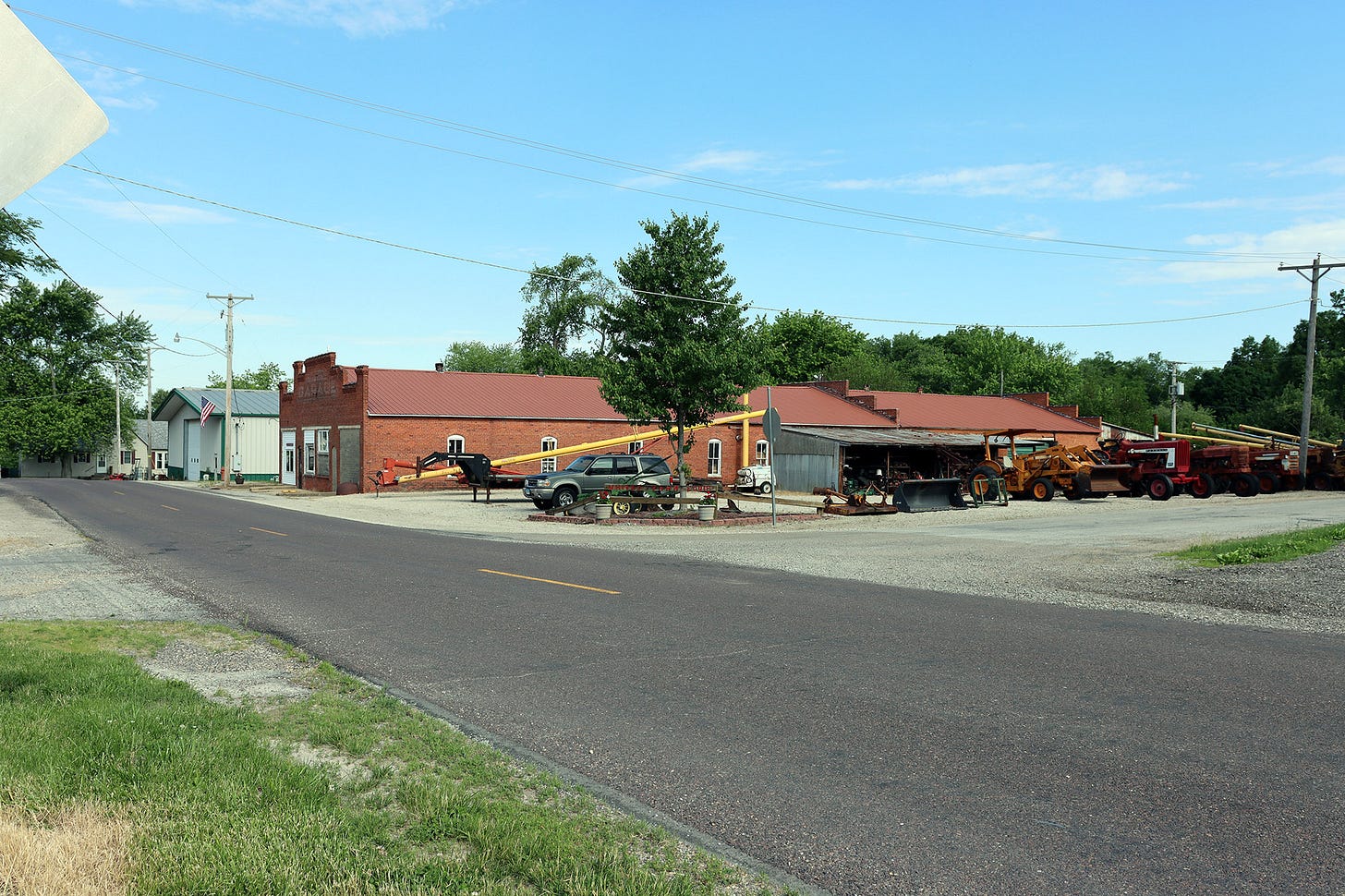


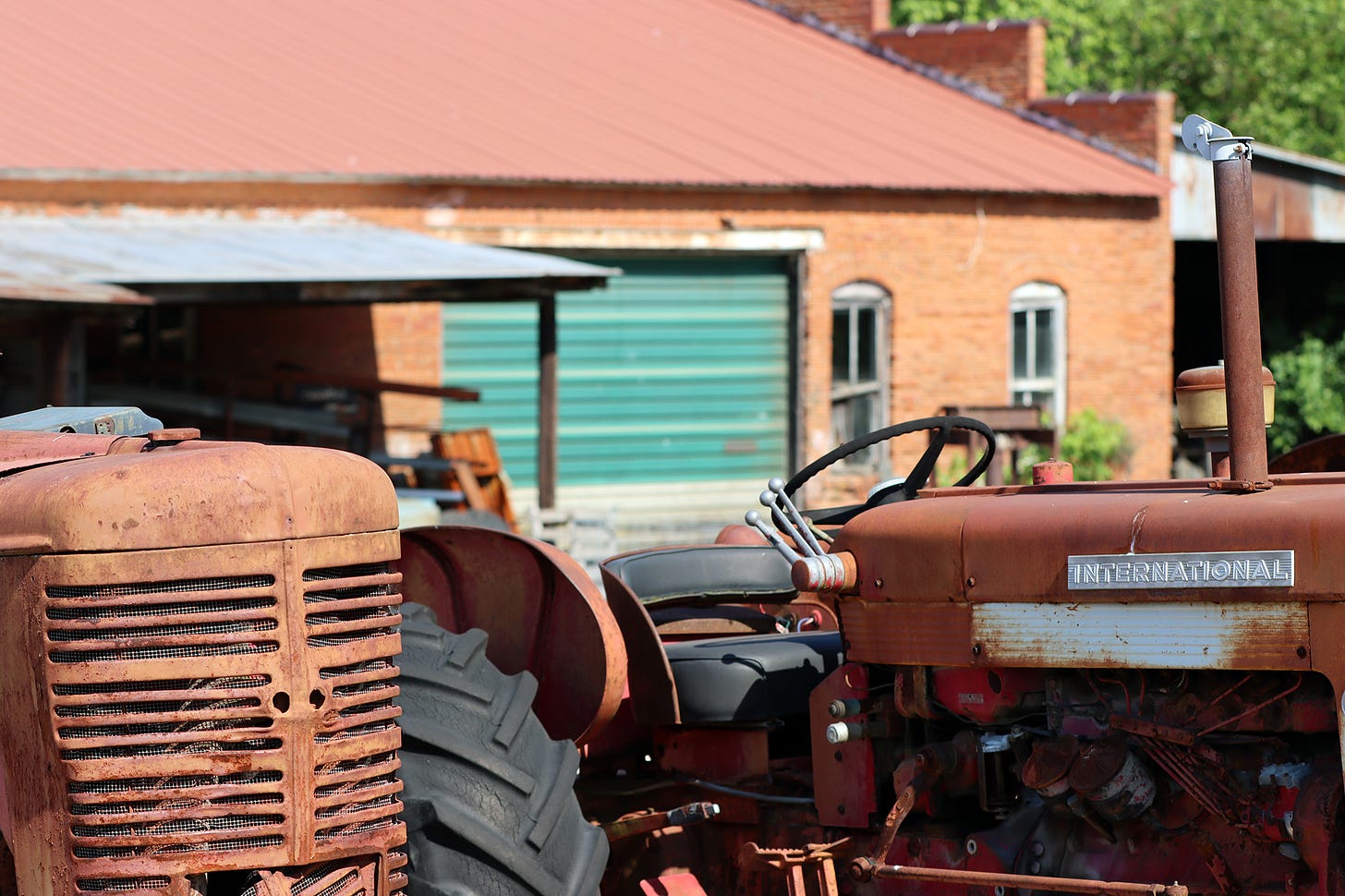

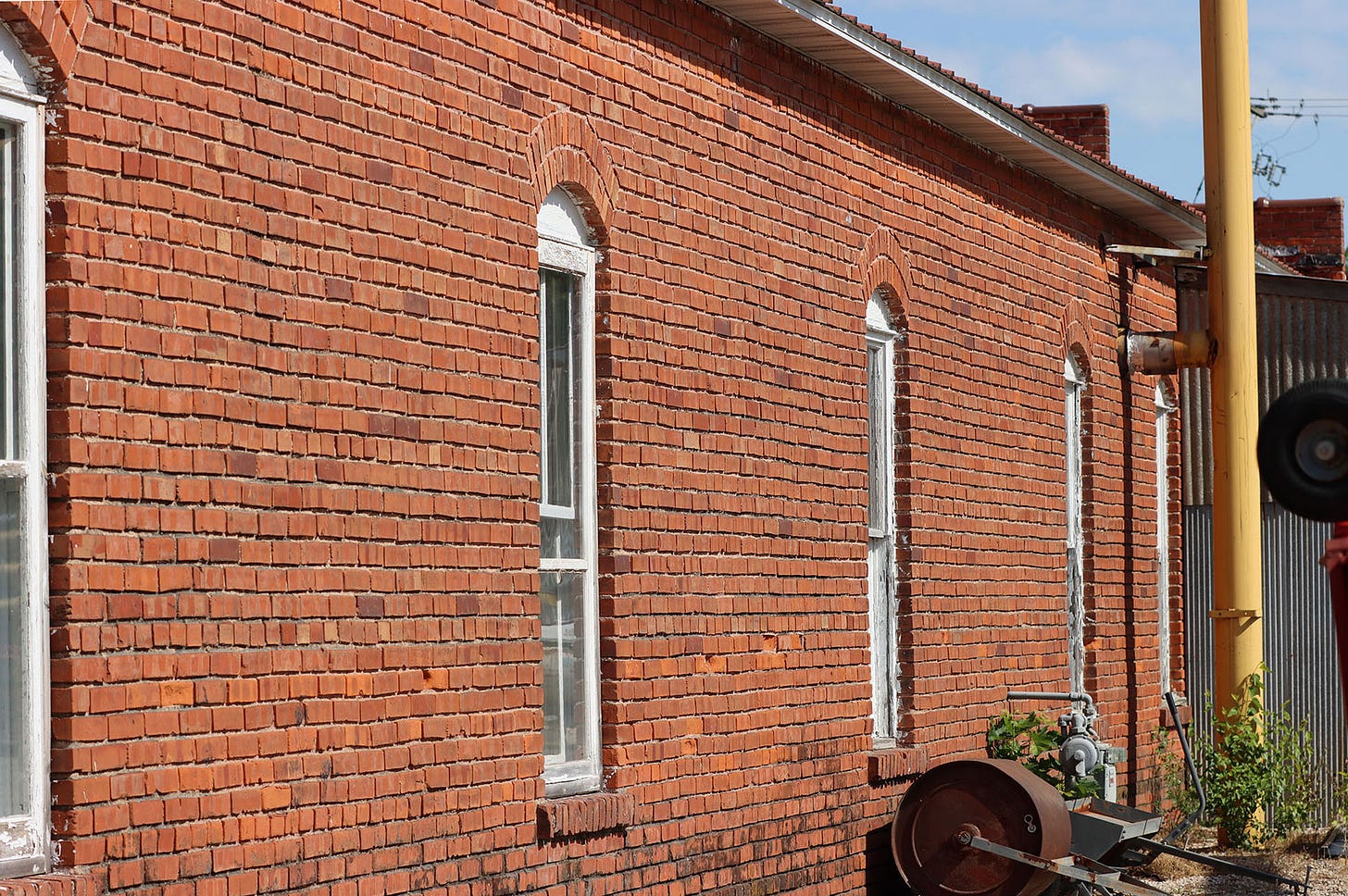
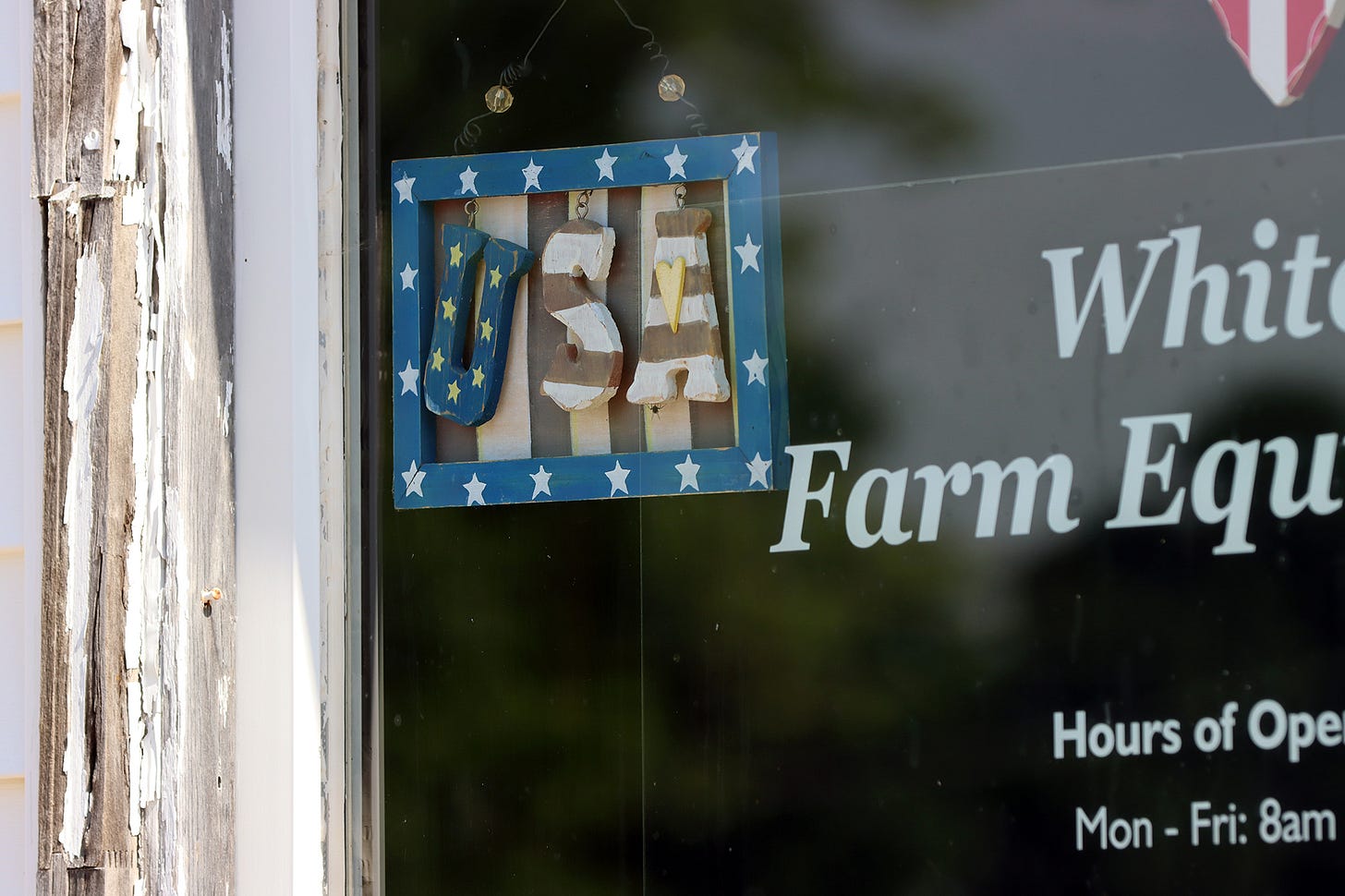
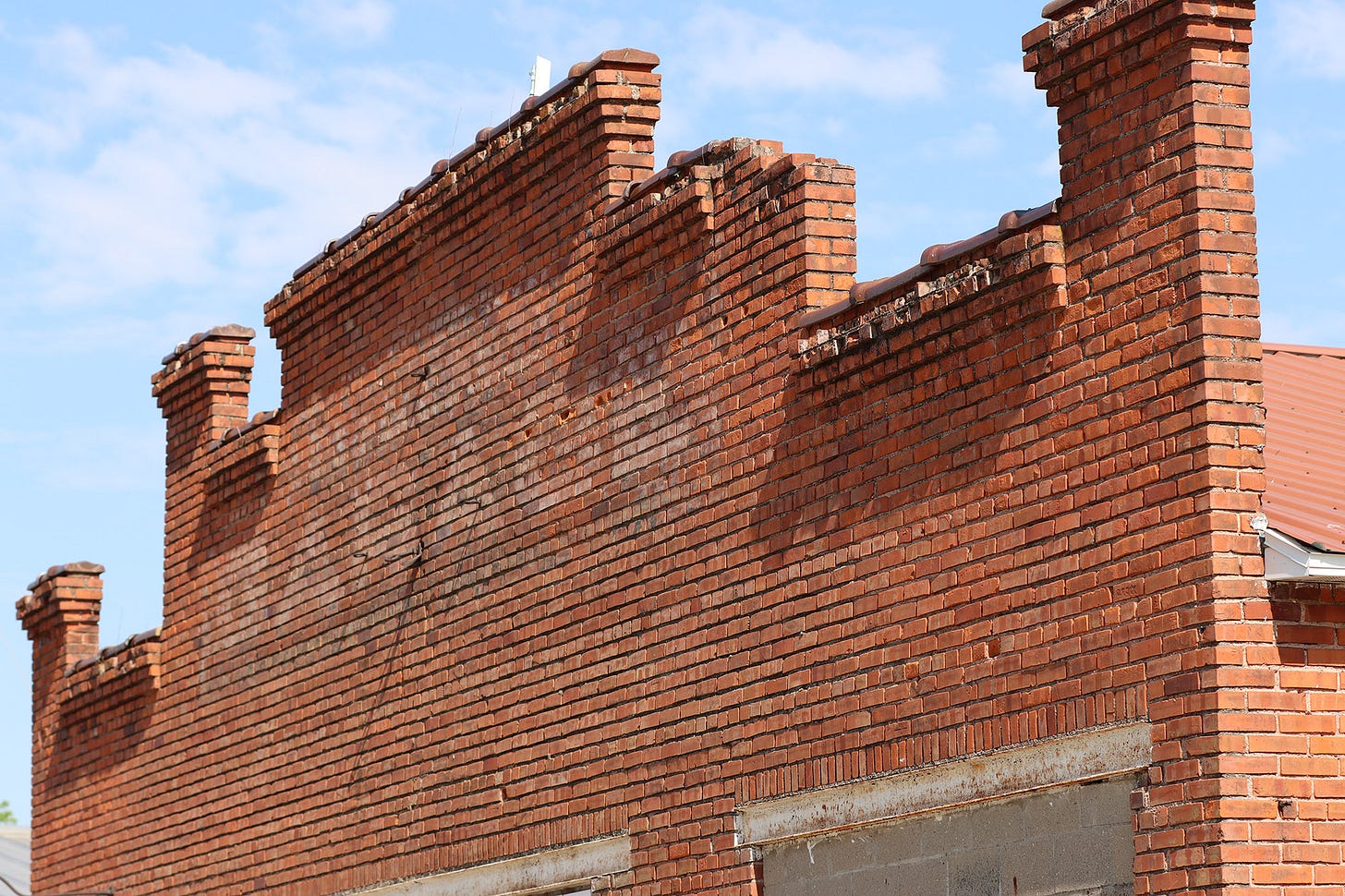
The Saint Bernard was Bernie. Saw him follow Jut to the garage every night to protect the place.